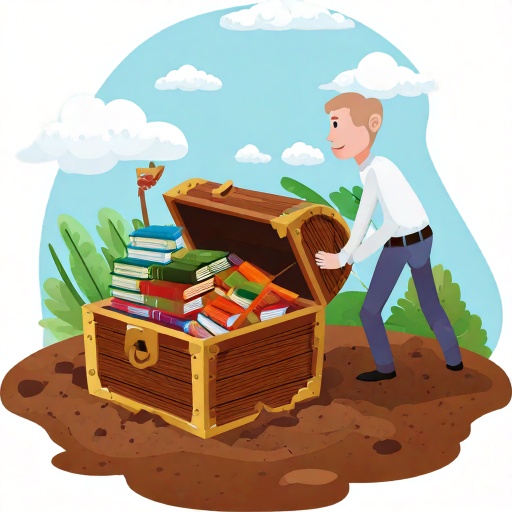

Busybird
Welcome to the Busybird blog, where you can find helpful articles, updates, industry news and more. Make sure you stay up to date by signing up to our newsletter below.
Get Digging
March 18, 2025
Too many writers sit around waiting for inspiration to fuel them through the course of their writing.
It just won’t happen.
Inspiration is such a small part of the writing process. The rest is hard work.
The reason so many writers fall away from their projects isn’t because they’re no longer inspired – or they’re not receiving a series of inspirations, like a string of firecrackers detonating one after another – but because they just don’t know their project well enough.
Regardless of your writing methodology, before you sit down to commit to the act of writing, you need to know what you’re writing about. This doesn’t necessarily mean you need to know every word and idea. Some things will develop organically. But you need to have an intimate familiarity with your content.
If you’re writing a novel, you need to know your world and how it functions. If it’s a contemporary story, jot down all the characters and locations you think you’ll use. Give them brief descriptions and histories. You’ll find this now begins to inform your narrative and contributes to shaping the plotting. If it’s an otherworldly story, you need to know how that place functions.
If it’s an autobiography, a biography, or history of some sort, jot down all the events you’ll cover in a chronology. Determine what the story’s going to be. It’s not just a recount of events. It might be about a triumph over illness, or building a business, or migrating and establishing yourself in a new country. These are just examples, but they demonstrate the story that’ll intertwine through that chronology and give form to the structure.
If it’s a nonfiction book that’s about some sort of methodology – e.g. how to reinvent your life – bullet-point all the things you’ll cover. Look at those bullets. How many of them are main topics? How many of them should be subjunctive of the mains? For example, I might jot down, “meditation”, “breathing exercises”, “self-care”, and “walking”, and then realise instead of having four separate chapters, I should have one chapter called “Self-care”, and put “meditation”, “breathing exercises”, and “walking” as things I’ll cover in that chapter.
If you sit around hoping you can improvise it all the way, and/or that inspiration will continue to inspire, you’ll be waiting around a long time, and grow discouraged.
Your idea is a clue to a treasure you find sitting on the surface of the earth. You’ll have to do some digging to find the rest.
So get digging.
The Bookstore Fiction
March 11, 2025One of the things we hear most from authors is this question: “How do I get my book in bookstores?”
Most indie bookstores are happy to talk directly with authors.

Chains tend to work with distributors – a distributor is a business whose sole purpose for existing is to try get books in bookstores. However, they’re not subcontractors. You don’t hire them the way you’d hire a plumber. The distributor will judge the merit of whether they believe they can get your book in bookstores. They’ll also need ready stock, which means you need a substantial print run for them to distribute.
Also, bookstores aren’t Facebook marketplace. They’re not happy to sell anything. They’ll also judge whether they feel they can sell a book. This might vary from store to store. For example, you’ve written a werewolf horror. Northland QBD might take ten because they sell a lot of horror, but Plenty Valley QBD might decline because that’s not something they sell much in their area.
As an aside, bookstores tend to work on consignment. That means you get paid when they sell the book. If they haven’t sold the books after an agreed amount of time, the books are returned to you. So if you printed 500 books in anticipation of sales, and they only sold 150, you get the 350 books back.
This is a quick recount of the process, because getting books in bookstores isn’t as easy as many think.
There’s also a greater reality at work here, too.
Just because your book is in a bookstore doesn’t mean it’s going to sell in big numbers.
Lots of authors have this misconception – all it takes to get a bestseller is getting your book in a bookstore. That’s it. Their job as an author is done.
Let’s break this down logically.
Here’s the first question to answer: have you been in a bookstore?
Second question: just how many books are in a bookstore? Hundreds? Thousands?
Who gets the prime real estate? Let’s say we’re talking fiction. The books that get the front-and-centre treatment are authors who have a readership and could sell their laundry lists. That means you’ll see Stephen King, Lee Child, Jodi Picoult, Liane Moriarty, etc.
If you don’t have a track record of sales, why would a bookstore sit your book among that esteemed company? You’re taking up room that an author with a good sales record could occupy.
Likelier, you’re going to be lost in the masses among the new releases on some table, or filed spine-out, alphabetically.
Now why are readers, en masse, going to randomly file into a bookstore, locate your book like they’re on an Easter Egg hunt, and buy it in meaningful numbers?
You’ll sell some. That’s likely.
But bookstores are filled with books, many of them better placed than yours. Are you expecting by some magic that consumers will ignore everybody else’s and migrate exclusively to yours? Why? Because you have a great book? Do you know how many authors think this?
I’m different, you think. You would be surprised just how many authors believe this. It’s great to have confidence, but you’re not alone, and wish fulfillment gets you nowhere.
Now let’s look at the online retailer: going to Amazon and typing in “horror novel”, I get fifty-five hits. First is Bram Stoker’s Dracula. At least in a bookstore, he’d be filed in some classic section. Here, he’s competing directly with you. Next comes John Langan’s The Fisherman, Nick Cutter’s The Troop (with the byline of “TikTok’s favorite horror novel”), a deluxe hardcover version of Bram Stoker’s Dracula, and then E.B. Hudspeth’s The Resurrectionist.
Scrolling down, I’m already exhausted.
Now Amazon’s search hits are cultivated to my browsing habits, but this will be largely the same return for most people.
Your book is a grain of sand on the beach.
So is this whole blog aimed at disheartening you?
No.
But it is designed to awaken you to the reality that having your book in a physical or online bookstore won’t automatically result in huge sales. I’m sure somewhere in the world, some random has gotten a good return, but this would be the exception, not the rule.
The truth is you have to create awareness for your book, and yourself as an author, and connect with readers. If you can do that, if you can create a buzz around yourself and your work, then consumers will go find your book, wherever it is.
If bookstores are getting inquiries from people asking for your book, they’ll order copies in. They want that business, after all.
But the truth is nobody ever finds something they’re not looking for.
The Ego in Writing
March 4, 2025Years ago, a forty-something friend went to an open workshop at his local library. This friend had been heavily published, worked as a writing mentor, and knew as much (if not more) about writing than most people in the industry.

He said he was petrified as he handed in his work. He was worried what people would say.
Then somebody else came in – a twenty-year-old who handed in his piece, and behaved so cocky he was bordering on arrogance.
My friend didn’t get it – how could he be so afraid of what the workshop would say when somebody with an iota of his experience was so confident?
It puzzled me for a while. Why such different attitudes? Surely the writer with all that experience and skill should be cocky, and the inexperienced writer should be insecure. That’s how it would work in any other field.
But eventually I realised the weird dichotomy at work.
The inexperienced writer knows very little. They’re confident in their writing to the point of obliviousness. Often, they just don’t know enough to see that there might be problems with their writing.
My friend, with all his experience in the industry, knew not only what might be wrong, but that there might even be stuff he hadn’t considered.
Writing’s a strange craft where the more you improve, the more experience you gain, the more insecure you grow.
That’s not such a bad thing, though.
Especially in dealing with feedback.
As much as that fear and insecurity might terrify us, it can – and should – drive us to improve.
It’s worth seriously considering every bit of feedback we receive. We don’t have to take it on, although if we do reject it, we need to measure whether we have a valid argument for rejecting it, or we’re rejecting it out of ego because we want to protect our own self-image.
As an aside, when we receive feedback, we don’t have to consider it literally. For example, a feedbacker might comment on a particular plot point. Now we might acknowledge there’s a problem, but instead come up with a different way to remedy it.
There’s a beauty in revision that opens boundless possibilities – ways to not only improve our work, but our skills as a writer.
So when it comes to writing, sometimes we have to put our ego to one side.
And ride the fear to something better.
Books Don’t Sell Themselves
February 25, 2025Too often in publishing, we encounter authors who think their job is done the moment their book is printed.

Then they come back in a year’s time to find they’ve only sold a handful and don’t understand why.
How are people going to know that your book exists?
Have you been in a bookstore? Have you seen the thousands of books you’re competing against?
Have you been on Amazon? Have you seen the millions of books that are all vying for the consumer’s attention?
Now I’m sure there’s some exception in the world where the author did zero promotion and, somehow, their book sold.
But that’s what it is: the exception.
The reality in this industry is that you have to create awareness for your work, as well as for yourself as an author.
The industry is more competitive than ever. With self-publishing growing increasingly accessible, with ebook publishing becoming as easy as uploading a Word document, you’re in a market that’s not necessarily saturated, but flooded.
Authors expect that their publisher has some magical marketing formula, but they don’t. They’ll do marketing within their own circles – that’s something else to keep in mind. Just how big are their circles? Just how many people are they hitting up?
Also, consider this: take a big, big multinational publisher who are releasing X amounts of titles a year. Do you think every one of them is a hit? No. Most will sell moderately, or underperform. So even with their big marketing departments and all their money, even they find it impossible to manufacture hit after hit.
This is why it falls more and more on the author to be their own best fan.
Think about ways to promote yourself. Try get book reviews. Pitch yourself to podcasts. Do social media. Think laterally.
Years ago, we saw Matthew Reilly give an author talk at Eltham Library. Reilly talked about how he would sit on a bus with his first book – a self-published title – and pretend to read it, making appreciative noises. He held the book splayed open, so everybody could see the title and cover.
Did it work for Reilly? Who knows how much it contributed to building his author brand?
But it shows somebody applying some innovative thinking to getting themselves out there.
You need to do the same.
Don’t expect it to happen.
Make it happen.
No Guarantees
February 18, 2025
There are some real sharks out there in the world of self-publishing.
I’m a writer – and have been for almost forty years. Kev Howlett, the owner of Busybird Publishing, has been a photographer and illustrator for just as long. His wife, Blaise van Hecke (who formerly ran Busybird Publishing until her unexpected passing), was also a writer.
We’ve always treated the prospective client the way we’d expect to be treated.
We’re not corporates. Anybody who’s visited us can attest to that. We’re laid back, the place is relaxed, and a big, bumbling blond Labrador greets you at the door.
But there are others out there who only care about making a buck. They will flatter you outrageously, stroke your ego, and fill you with unsupportable claims.
Take Shawline Publishing, for example. A Ballarat self-publisher, they went belly-up last year. The Sydney Morning Herald and ABC wrote articles calling into question the practices of their CEO.
One of Shawline’s promises was to build you into a “midlist author”.
Great claim. Genius, really. Promise bestsellers, and it sounds too fantastic to be true. But midlist? Well, that doesn’t seem that out of reach, does it?
Is it manageable, though?
Uh uh. And that has nothing to do with you, the author.
The reality is there are big multinational publishers out there with marketing departments that, despite their best efforts, can’t build their authors into “midlist authors”.
We can’t control these things because we can’t control the consumer, the market, or what the trends are at any given time. You might’ve written a fantastic horror story about werewolves, but just a week earlier a werewolf story came out and captured the market. Or tastes might’ve morphed into romcom.
Anybody who makes you a promise that they can guarantee any level of success is outright lying. They can try. That’s different. But they have no control over the outcome. This isn’t Facebook marketplace.
If there was a formula to this, then publishers would have hit after hit after hit.
They don’t.
We had a situation a couple of years ago where we spoke to a young author about his nonfiction book. I read a few chapters and gave him some honest feedback. He went elsewhere, where they told him his book was fantastic and it just needed to get out onto the market. Six-thousand dollars and eighteen months later, he has no book.
Now this blog isn’t an attempt to exalt us, and condemn everybody else. It’s simply to warn you to be careful. Whoever you’re dealing with, ask questions. Check websites, like Writers Beware for any red flags.
If somebody’s selling you a scenario that sounds too good to be true, it probably is.
Most importantly, keep all your rights and royalties. If you’re self-publishing, there is no reason to surrender even a single percent of these, unless the self-publisher is selling your book directly. But even in this case, they should only be garnering commission from the books they’re selling.
The writing life is tough enough already – some people will call that outlook pessimistic. But it’s true. It’s hard. You can have every confidence of success, you can believe in yourself and your work, and I commend that. You need to nurture that self-belief.
You need to persevere, to push and push and push, to give yourself every chance of succeeding.
Just know there are no guarantees, and anybody who tries to tell you different isn’t being honest.
